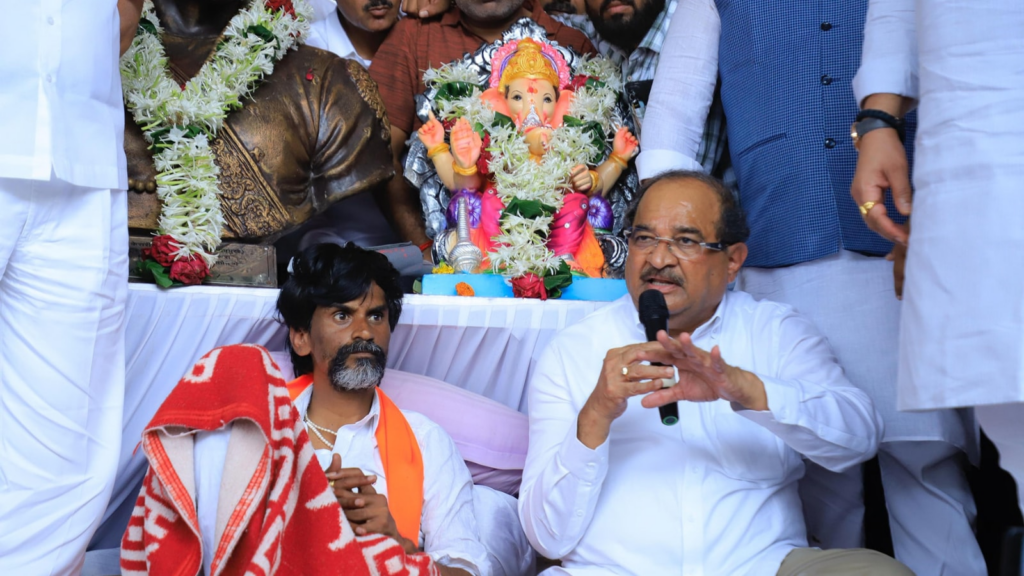MumbaiSeptember 4, 2025 05:54 PM IST
First published on: Sep 4, 2025 at 05:43 PM IST
As the Mahayuti government faced the prospect of a protracted Maratha quota agitation and the BJP’s allies Shiv Sena and Nationalist Congress Party (NCP) stayed their hands, it fell on Chief Minister Devendra Fadnavis to steer the ruling alliance out of the crisis. And three days into the agitation, as Maratha quota activist Manoj Jarange Patil looked to harden his position, the CM dispatched Radhakrishna Vikhe Patil to get him to stand down and resolve the stalemate.
Vikhe Patil, who heads the Cabinet Subcommittee constituted to consider the Maratha quota demand, immediately got to work and met Advocate General Birendra Saraf to discuss the legal issues related to the reservation issue. Within two days, the senior minister managed to achieve a breakthrough and came up with the government resolution that got Jarange Patil to end his hunger strike in Mumbai.
“The responsibility entrusted to Vikhe Patil by the CM was well executed. Along with his team members, he worked hard to resolve the stalemate,” said senior BJP minister Chandrashekhar Bawankule.
A seasoned politician who maintains a low profile, Vikhe Patil belongs to a family whose three generations have been pioneers of the cooperative movement in Maharashtra. The 66-year-old was appointed the head of the Cabinet subcommittee on August 22, replacing Chandrakant Patil, even as Jarange Patil was threatening to march on Mumbai. This proved to be an inspired choice as Vikhe Patil, known for maintaining his calm and composure under pressure, dealt with Jarange Patil with equanimity in the face of the activist’s strong rhetoric from the protest stage at Azad Maidan.
An eight-term MLA from Shirdi, a seat that he has been winning since 1995, Vikhe Patil comes from an illustrious political family in Ahmednagar district in western Maharashtra. His grandfather Vithalrao Vikhe Patil was a stalwart of the cooperative sugar movement in Maharashtra and his father Balasaheb Vikhe Patil kept the political legacy intact through his work in the education and agriculture sectors. Vikhe Patil started his political career with the Congress, where he made a steady rise that culminated with his election to the Assembly from Shirdi. However, the 1995 election saw the Shiv Sena-BJP elected to power in the state for the first time, dislodging the Congress and Vikhe Patil jumped to the Sena.
Though he was made a minister, he could not remain in the Balasaheb Thackeray-led party for long and was back in the Congress in 1999 as the party returned to power along with the NCP. In the coalition government that was in power till 2014, he remained a Cabinet minister with different portfolios such as agriculture, school education, cooperative, food and drugs administration, transport, and law and judiciary. When the Congress was voted out of power in 2014, Vikhe Patil was appointed the Leader of the Opposition (LoP) in the Assembly.
However, his decisive break with the Congress came ahead of the 2019 Lok Sabha polls as he was upset with the party for not giving his son Sujay, a neurosurgeon, a ticket. Sujay contested the polls from Ahmednagar on a BJP ticket and won. Vikhe Patil followed suit before the Assembly polls a few months later, ending his decades-long association with the Congress. In the BJP-led government that came to power after the fall of the Maha Vikas Aghadi (MVA) administration in 2022, he held the revenue portfolio. Though he is learnt to have expected a better portfolio after the Mahayuti’s return to power last year, he had to settle for the Water Resources Ministry.


